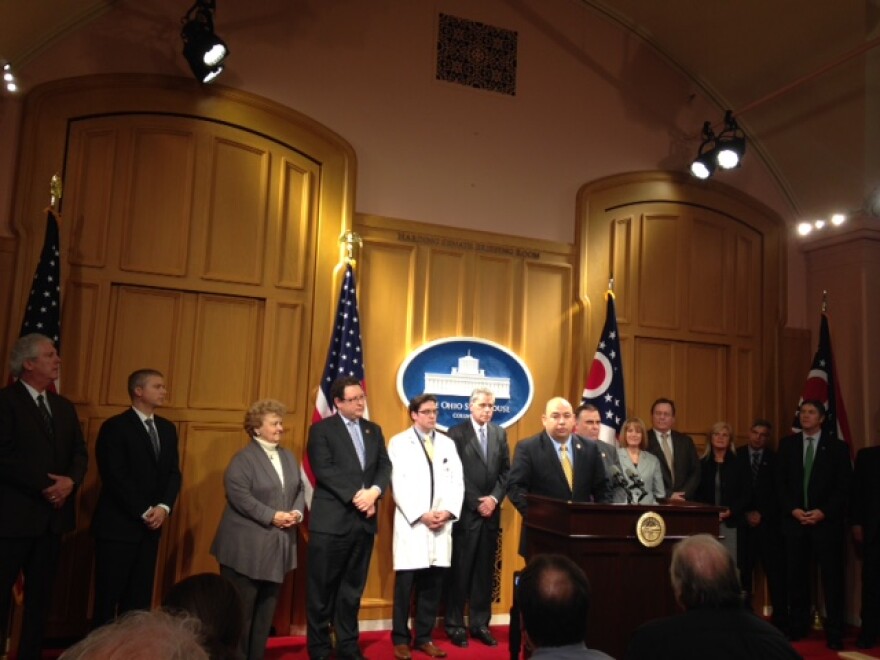Ohio lawmakers who have been signaling they want to consider medical marijuana legalization have taken an unexpected step.
Republican House Speaker Cliff Rosenberger stood in front of an interesting group of people when he announced there will be a task force to study medical marijuana in Ohio.
“There’s a lot of groups that are going to have interest in this topic and what we have tried to do is put together a group of interested parties that can represent a broad swath of different interest groups throughout the state with different aspects and different varieties with an open mind to hear out this issue and talk about this issue before us in medical marijuana.”
That diverse group on this task force includes representatives from the Ohio State Medical Association, the Ohio Children’s Hospital’s Association, the Fraternal Order of Police, the Buckeye State Sheriffs' Association, the Ohio Chamber of Commerce and former Ohio Attorney General Betty Montgomery. And there are two somewhat surprising members: Chris Stock and Jimmy Gould, former leaders of ResponsibleOhio, the group that brought forward the pot plan that voters overwhelmingly rejected last fall. Gould says he's glad to be working with the groups that had fought against Issue 3 last fall.

“Ohio needs medical marijuana, first and foremost and needs it for everything….for chronic pain, for conditions, but it needs to be regulated properly. It needs to be done the right way. We went from probably zero to 250 miles an hour in a state that it is a little difficult to go from zero to 100. I’m prepared to accept 100 right now and that is to pass a legislative action for medical marijuana.”
Gould says he’s agreed to put any effort to legalize marijuana on hold for now. And he says the Fresh Start plan, the initiative that would allow people with past non-violent marijuana offenses to clear their records, is dead for now.
“You can’t expunge without having legalization. The voters knew that. They knew exactly what they were doing when they voted the way they voted. I had to hear them. We spent $25 million, we got defeated. And when you lose, you get back up on your feet and you take the best path that is available to you. When we were approached by several people and I approached several people, you know we want a victory out of this thing and the victory we want is what is good for Ohio and we have always wanted that.”
Just last month, Ian James, the man who headed up the failed ResponsibleOhio campaign, said investors of it wanted to go back to the ballot this fall with another legalization plan. The ResponsibleOhio campaign had been renamed Free Market Ohio and James said it was full speed ahead to collect petition signatures to put medical marijuana legalization on the ballot this fall. But Gould says moving forward with that right now is not the answer.
“We didn’t just lose 51 to 49. We got beat. And I come from a competitive sports family and world and we got beat. And when you get beat that way, you come back and figure out, ok, what’s the next best way? FreeMarket Ohio was not the answer.

Republican State Representative Kirk Shuring will head up the task force. And he says while it will meet several times between now and the end of March, there is no promise of specific legislation. He says this task force is an opportunity for different groups of people with different ideas on the subject of marijuana to get together to try to find some common ground.
“We have a time out and we are going to have a conversation and we are optimistic that it will lead to something we can point to at the end of March.”
Meanwhile, Ohio Senators plan to approach the issue of medical marijuana differently. Republican Senate Caucus Communications Director John Fortney says Republican Senator David Burke and Democratic Senator Kenny Yuko plan to hold a series of town hall meetings on medical marijuana in public forums throughout the state.
“The people of Ohio are not interested in seeing the pill mill equivalent of medical marijuana on every street corner in the state of Ohio. That said, we understand that there is some support for what it can do for people who are suffering from chronic illness and I think that’s going to be part of the conversation from these public forums.”
Fortney says he thinks Senators and Representatives can work together, along with input from interest groups and the general public, to come up with good policy on medical marijuana in the future.





